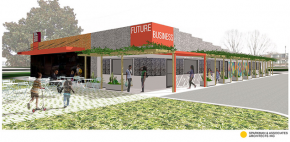
Bailey Foster is three years into the Real Good Kitchen initiative and still pushing forward
 “We’re coming-up on the three-year mark of this whole journey,” says Bailey Foster, Founder of Real Good Kitchen. “Honestly, I expected to have launched by now.”
“We’re coming-up on the three-year mark of this whole journey,” says Bailey Foster, Founder of Real Good Kitchen. “Honestly, I expected to have launched by now.”
We first met the Knoxville native nearly two years ago and shared her vision for a high-quality commercial production kitchen and storage space for established businesses such as caterers and food truck operators, an event venue, and a culinary business incubator in this teknovation.biz article in October 2018.
Even as she acknowledges the project has not gone as fast as she had expected, Foster says in her typical upbeat manner that she’s planning to launch the shared kitchen facility in East Knoxville by mid-Summer. She reached a major milestone last fall when she was able to acquire two side-by-side buildings at 2002 and 2004 East Magnolia.
“I’m really happy we’ve found the space,” she says. “This was a real game changer for us. We’re delighted we found a home in East Knoxville. The location aligns with our mission to support small food businesses, with a special focus on those owned by women and people of color, and we’re determined to be great partners in an equitable and inclusive redevelopment of the Magnolia Corridor.”
 Collectively, the two buildings are just under 7,000 square feet inside (see concept here). When the first phase of Real Good Kitchen opens, Foster says the venture will utilize about 2,500 square feet for the shared kitchen and storage areas.
Collectively, the two buildings are just under 7,000 square feet inside (see concept here). When the first phase of Real Good Kitchen opens, Foster says the venture will utilize about 2,500 square feet for the shared kitchen and storage areas.
“Our goal is to build-out the infrastructure for the kitchen but grow into our use of the space” she explains. Another 3,500 square feet will be available for lease, ideally to food or food-adjacent businesses, but also for anyone interested in sharing space with Real Good Kitchen and having a focus on supporting the East Knoxville community.
“This (leasing of some of the space) gives us room to stabilize and grow sustainably,” Foster says.
One issue that has slowed Real Good Kitchen’s progress is a common challenge for local start-ups – access to capital, something Foster describes as the first barrier and an on-going challenge. Real Good Kitchen is structured as a B Corp, which means it balances profit with public good. She has been able to sell the mission and reasonable return on investment to some early investors. Establishing an Opportunity Zone Fund for the project at the end of last year convinced a few more.
“We still need about $100,000 for infrastructure improvements to the building and $200,000 for kitchen equipment and some operating funds,” she says. One of the key improvements is a new roof; the building leaks. Other upgrades include improvements to the electrical, gas and plumbing systems as well as installation of a grease trap.
“We’ve really tried to streamline essential upgrades and improvements to the building as much as we can.” Foster says. She is selling equity in the building LLC and in Real Good Kitchen for a minimum investment of $5,000. She continues to take investment through the OZ Fund as well and expects to launch a crowdfunding campaign in May to generate some of the needed operating capital.
Tenacity is clearly a trait that Foster demonstrates, and failure is not an option that she will consider. If anything, her resolve has only increased.
“I thought we needed it (Real Good Kitchen) when I started this journey three years ago,” Foster says. “I know it is needed now.”
While acknowledging that “we can’t open without the investment,” she adds later in our conversation, “We’re going to make it happen. We’re going to get started and see how far we can go. We invite community-minded investors to join us in bringing this much-needed project to life.”
Like what you've read?
Forward to a friend!

